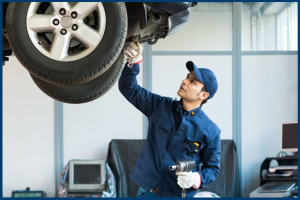Get Pre-Approval Now
- We Buy Cars!
- Click Here!
 Navigating the roads with confidence starts with knowing you have good tires. If you’re pondering whether your car, truck, or SUV needs tires, you’re taking a step in the right direction. Here are some signs that you might need to visit your local dealer for new tires.
Navigating the roads with confidence starts with knowing you have good tires. If you’re pondering whether your car, truck, or SUV needs tires, you’re taking a step in the right direction. Here are some signs that you might need to visit your local dealer for new tires.
Tread Depth
The most straightforward way to assess tire health is to examine the tread depth. A common method is the penny test. Insert a penny with Lincoln’s head facing down into the tread. If the entirety of his head remains visible, the tread depth is below 2/32 inch, and it’s time to replace your tire.
Uneven Wear Patterns
Uneven wear indicates that there might be an issue with your vehicle’s alignment, suspension, or even with the tire itself. Look for patterns such as cupping, patchy wear, or feathering. Any of these suggest that the tire isn’t contacting the road uniformly, which can compromise safety and efficiency.
Frequent Loss of Pressure
If you find yourself needing to refill your tires with air more frequently than usual, it may be indicative of small punctures or leaks. While occasional air top-ups are normal, consistently low tire pressure could signify a larger issue.
Sidewall Cracks
The sidewall of your tire can provide a lot of information about its health. Tiny cracks may start appearing on the sidewall, which can eventually grow larger. This breakdown compromises the structural integrity of the tire and increases the risk of a failure.
Sidewall Bulges
Bulges or blisters on the sidewall are typically caused when the internal frame of the tire is damaged, allowing air pressure to reach the outer layers of the tire. The result is a protruding bubble. Driving with a bulging tire is dangerous, as it’s a weak spot under high internal pressure. This spot can burst, leading to sudden loss of control at higher speeds.
Excessive Vibration
While some vibration is normal, especially on poorly paved roads, if your vehicle starts to shake more than usual, it could be an indication of an internal problem with the tire. It might be a misalignment issue, or a tire could be damaged from the inside.
Age of the Tires
Tires, even if rarely used, have a natural life span. Rubber degrades over time, and this process can be accelerated by factors like heat, sunlight exposure, and temperature changes from summer to winter and back again. Generally, it’s recommended to consider tire replacement every six years, regardless of their appearance.
Your vehicle deserves the utmost care to ensure safety and optimal performance. Contact Duncan Suzuki today for tires if you’re noticing any signs that your old ones are on the way out.



